BASC Species of the Month – February
BASC’s Dr Conor O’Gorman takes a look at his favourite bird species – the enigmatic grey partridge…
Get information on the legal shooting season for mammals and birds in the UK.
Apply for funding for your project or make a donation today
Comprehensive information and advice from our specialist firearms team.
Everything you need to know about shotgun, rifle and airgun ammunition.
Find our up-to-date information, advice and links to government resources.
Everything you need to know on firearms law and licensing.
All the latest news and advice on general licences and how they affect you.
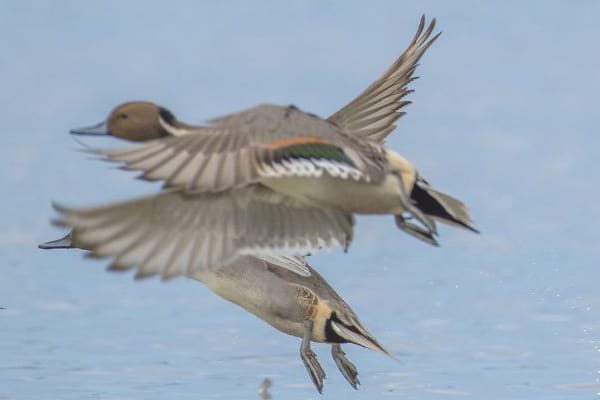

We had a look at Ducks Unlimited, a US-based organisation founded by hunters and dedicated to conserving and restoring wildfowl habitat.
In the UK we are rightly proud of our wildfowling heritage, having been at the forefront of bird conservation for more than a century following the founding of WAGBI in 1908 by Stanley Duncan. But on the other side of the Atlantic, an American organisation, Ducks Unlimited (DU), has built up an enviable reputation in bringing hunting and environmental interests together, with government support, to create and improve habitat for waterfowl.
Ducks Unlimited got its start in 1937 during the Dust Bowl when North America’s drought-plagued waterfowl populations had plunged to unprecedented lows. Determined not to sit idly by, a small group of sportsmen joined together to form an organisation that became known as Ducks Unlimited. Its mission: habitat conservation.
Thanks to decades of abiding by that single mission, DU is now the world’s largest and most effective private waterfowl and wetlands conservation organisation that can multilaterally deliver its work through a series of partnerships with private individuals, landowners, agencies, corporations, scientific communities, farmers, and other entities.
Ducks Unlimited is a not-for-profit, grassroots, volunteer-based organisation. Its members are conservationists and outdoor enthusiasts who live primarily throughout the United States, Canada, and Mexico. Over the last 85 years, Ducks Unlimited has grown into an astonishing success story, with more than 15.5 million acres conserved and counting. In 2022 the organisation protected and restored more than 575,000 acres of wetlands and other wildlife habitats across the United States alone.
Equally impressive is DU’s record in fundraising; in the last financial year, it generated revenues of $276.7 million.
We spoke to Matt Harrison, DU’s outdoors experience coordinator, to find out more about successes, challenges, finances and membership initiatives.
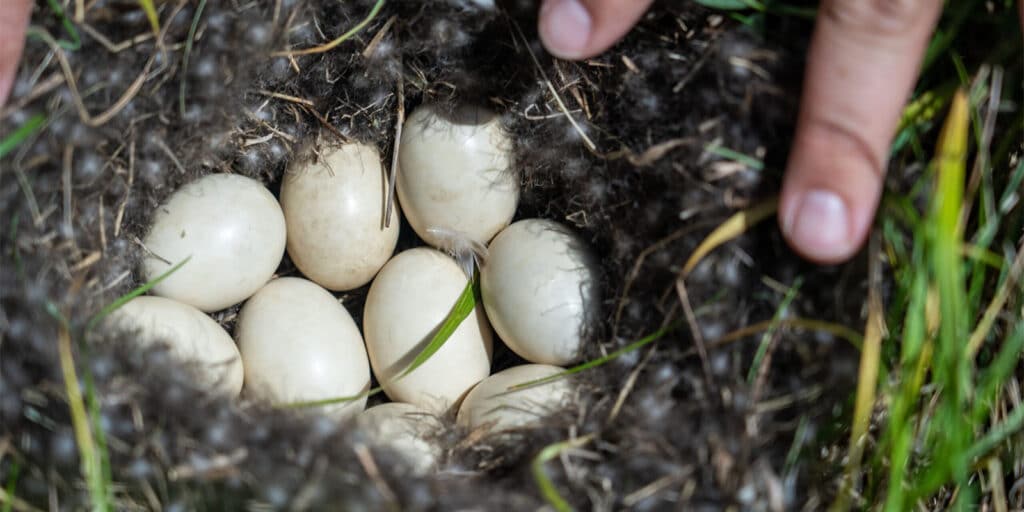
I think that one thing is, we’re so fortunate with the abundance of wildlife. From waterfowl to turkeys to deer, to pheasants, all the way from the north to the southern part of the States, you can find some type of wildlife.
Just about every state is rich in some type of wildlife. I’m originally from Mississippi and, as an avid waterfowler, I love to chase ducks in the south-eastern part of the United States.
But you know, it’s not just about hunting, and that’s the one thing people may misunderstand about Ducks Unlimited. They think it’s a hunting organisation. Of course, we do have members who hunt, but we are a conservation organisation that is dedicated to conserving habitat not only for waterfowl, but other species, too.
We have some members who love to hunt and some members who have never been hunting a day in their life, but what brings us together is that conservation is a priority for everyone. Everyone who works for us and with us truly has a heart for conservation and wildlife.
Everyone who wants to hunt waterfowl in the US has to buy a stamp issued annually by the federal government, which costs $25. For every dollar you spend on federal duck stamps, 98 cents go directly to purchase vital habitat or acquire conservation easements for protection in the National Wildlife Refuge System.
Former President Franklin D. Roosevelt signed the Migratory Bird Hunting Stamp Act in 1934 to protect wetlands that are vital to the survival of migratory waterfowl. It’s a huge deal. It’s really cool how we’re able to get funds through the duck stamp, officially known as the Migratory Bird Hunting and Conservation Stamp. It’s also used to gain entrance to national wildlife refuges. Ducks Unlimited and its partners receive some grants straight from the government and also some gifts from certain donors.
Revenue from government grants and partnerships was a record-breaking $135 million last year.
Our policy team here at DU deals a lot with our governmental side. And yeah, thankfully a lot of our politicians and officials see the importance of conservation and how if we don’t act now, it’s going to affect the country long-term.
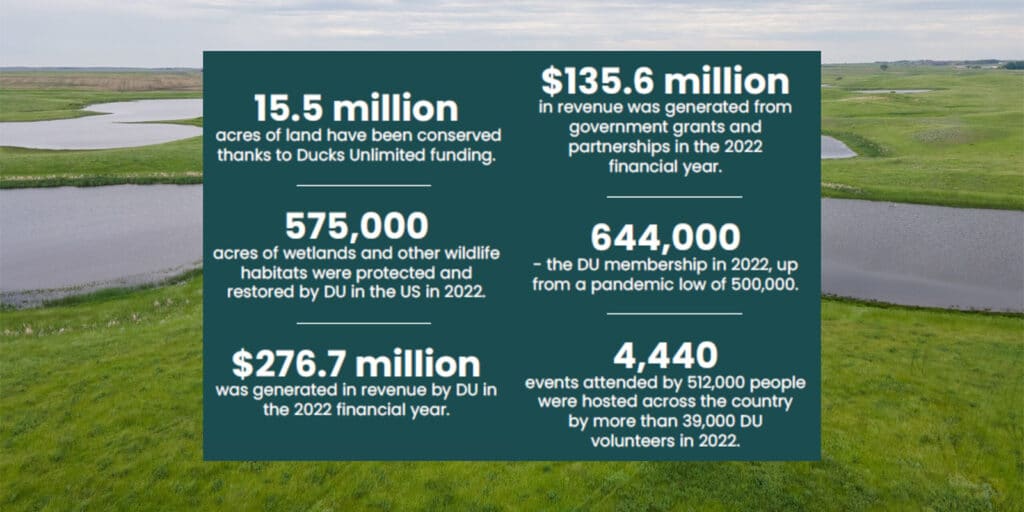
Some of the most important habitat for waterfowl over the years has been degraded due to many different reasons.
We’re losing a substantial amount of wetland and prairie habitat to human development. Our mission is to conserve, restore, and manage wetlands and other associated habitats for wildlife. The challenge is getting people to understand the importance of conservation.
Yeah, we may have waterfowl right now in 2023, but how will we be able to guarantee our waterfowl for future generations? If we don’t put in the time, effort, and resources to protect our habitat for waterfowl, who knows where it’s going to be in 50 years’ time?
Ducks Unlimited is truly fortunate to have great volunteers and partners who truly understand the mission. Having everyone working in unison is very important and very beneficial when it comes to getting the job done. The bottom line is we are all on the same team working towards the same goal – and that is filling the skies with waterfowl.
We do not shoot any type of lead shot at waterfowl here in the US; it is completely against the law here in the United States and has been for many years. We can still shoot lead at other game, like mourning doves, turkeys and so on.
Absolutely. If Ducks Unlimited did not have that volunteer support, we would not be the organisation we are today. We have thousands upon thousands of volunteers who help put on these events. They do so much for the organisation.
One of the key events is the annual Ducks Unlimited banquets that are organised by practically every hunting community across the US. Generally speaking, you can drive for less than 30 minutes and be at some type of DU event each year.
Yes, we had a great year in 2022. Our volunteers did an amazing job of putting on events. Even during lockdown our members and volunteer teams put on virtual events which were well attended. But it was good to get boots on the ground again and get back in the game. We hit the ground running.
One of those major events in February was the East Cooper DU chapter’s 25th Annual Oyster Roast and Lowcountry Cookout in South Carolina. More than 1,400 event attendees from across the country filled the Charleston Visitor Center Bus Shed in February as the chapter kicked off the 2022 Southeastern Wildlife Exposition, raising a record-breaking $350,000 for the ducks.
For the year 2022, 88 per cent of the money we received at Ducks Unlimited went back into the ground for conservation, which is astonishing. That itself speaks volumes about the work that our teams are doing.
The Prairie Pothole Region (PPR) is the core of what was once the largest expanse of grassland in the world, the Great Plains of North America. When the glaciers from the last ice age started receding 10,000 years ago, they left behind millions of shallow depressions that are now wetlands, known as prairie potholes. The potholes are rich in plant and aquatic life, and support globally significant populations of breeding waterfowl. Agricultural development has led to considerable wetland drainage. The Great Plains and PPR top the 25 most important and threatened waterfowl habitats on the continent.
Millions of ducks and geese pass through the PPR each spring, nesting in the grasslands. The PPR provides important breeding habitat for pintails, mallards, gadwall, blue-winged teal, shovelers, canvasbacks, and redheads. It is also an important migrations habitat for waterfowl breeding in the Boreal Forest and Arctic, such as lesser scaup, wigeon, green-winged teal, Canada geese and snow geese.
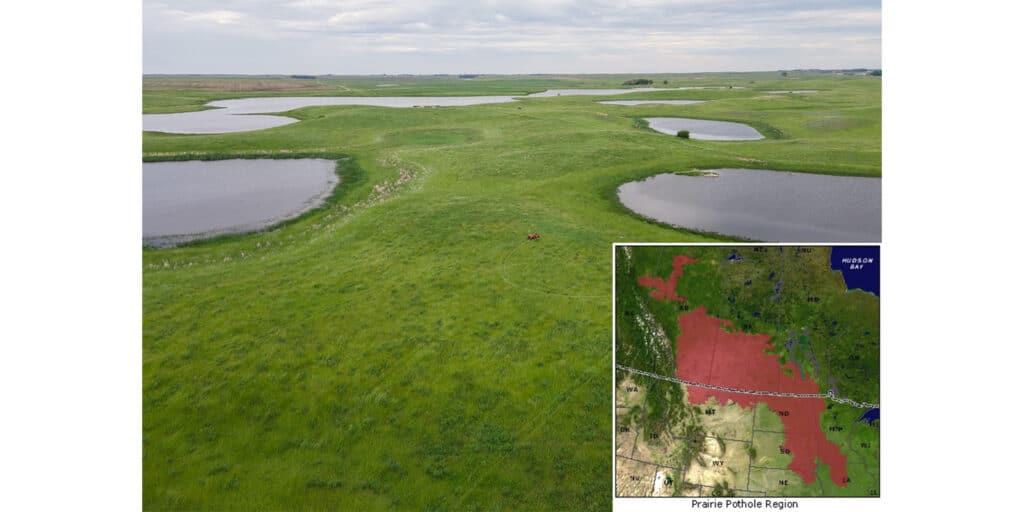
Between 50 to 90 per cent of the potholes in some regions have been lost or severely degraded – a trend that continues today. Sixty to 90 per cent of the original native grasslands have been lost, and loss of native and restored grassland continues today. Shallow lakes in the eastern portion of the PPR are severely degraded by high water levels and rough fish populations caused by wetland drainage systems.
Habitat programmes delivered by DU and its partners on the PPR are among the most aggressive on the continent. They include perpetual protection of native habitats through easements or ownership, conversion of land use to functions more favourable to wildlife, and stewardship programmes. DU’s Preserve Our Prairies initiative aims to perpetually protect almost 600,000 acres of the most productive remaining waterfowl habitat. The cross-border initiative covers North Dakota, South Dakota, Montana, Wyoming, Manitoba, Alberta and Saskatchewan.

BASC’s Dr Conor O’Gorman takes a look at his favourite bird species – the enigmatic grey partridge…
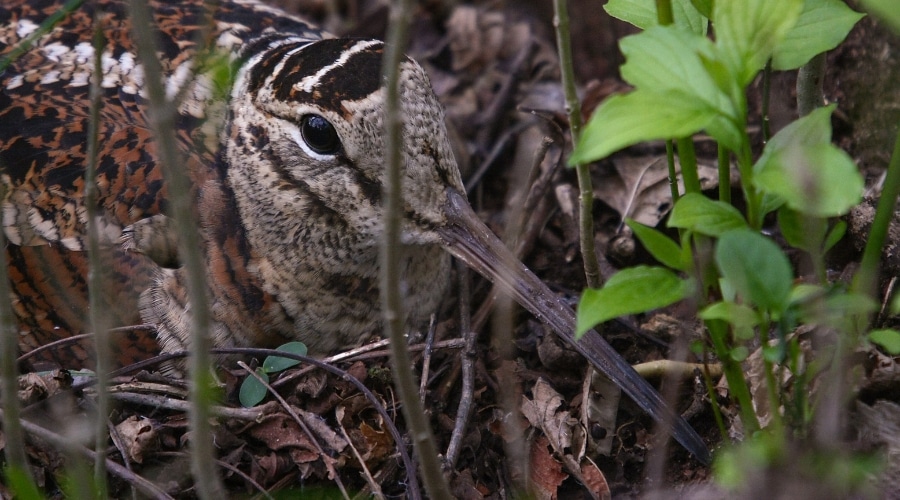
The shooting community leads by example on woodcock conservation, undertaking research, habitat creation, predator control and a precautionary voluntary restraint.
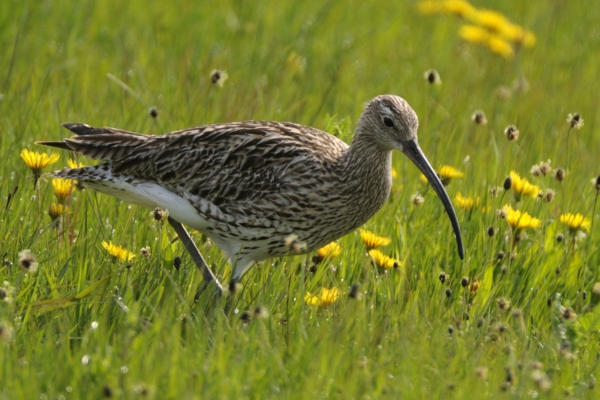
BASC joined the Deputy First Minister, Huw Irranca-Davies, on a national park visit to to see how targeted conservation measures are helping curlew in Wales.
Sign up to our weekly newsletter and get all the latest updates straight to your inbox.
© 2025 British Association for Shooting and Conservation. Registered Office: Marford Mill, Rossett, Wrexham, LL12 0HL – Registered Society No: 28488R. BASC is a trading name of the British Association for Shooting and Conservation Limited which is authorised and regulated by the Financial Conduct Authority (FCA) under firm reference number 311937.
BASC Direct Ltd is an Introducer Appointed Representative of Agria Pet Insurance Ltd who administer the insurance and is authorised and regulated by the Financial Conduct Authority, Financial Services Register Number 496160. Agria Pet Insurance is registered and incorporated in England and Wales with registered number 04258783. Registered office: First Floor, Blue Leanie, Walton Street, Aylesbury, Buckinghamshire, HP21 7QW. Agria insurance policies are underwritten by Agria Försäkring.
If you have any questions or complaints about your BASC membership insurance cover, please email us. More information about resolving complaints can be found on the FCA website or on the EU ODR platform.